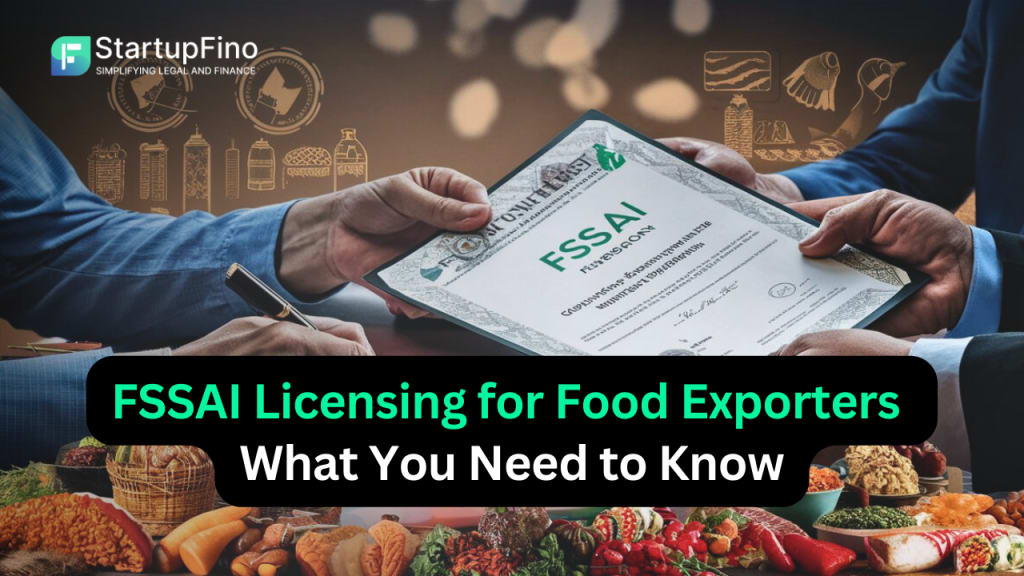FSSAI Licensing for Food Exporters: What You Need to Know
StartupFino

India's food industry has been developing quickly both in domestic & international industry. With all the increasing demand of Indian food items globally food exporters have to abide by food safety & quality laws. A significant regulatory requirement for Food businesses in India is a license from Food Safety & Standards Authority of India. This blog discusses the significance, application process, types of licenses and compliance with FSSAI licensing for food exporters.
FSSAI License for Food Exporters
This is why FSSAI license is important for food exporters:
1. Market Access: An FSSAI license can make food exporters credible and opens doors to overseas markets. It's a mark of quality assurance meeting international standards.
2. Consumer Trust: With an increasing concern about food safety, customers seek products certified by recognized authorities. An FSSAI license provides customers confidence that the food is safe and quality.
3. Compliance with Standards: FSSAI sets standards for food articles and food exporters have to meet those safety and quality standards.
Types of FSSAI Licenses
Food exporters can apply for 3 kinds of FSSAI license, according to their nature and size of business:
1. Basic Registration: For small food businesses with annual turnover up to INR 12 lakhs. This applies generally to small exporters.
2. State License: For medium sized food businesses that have a revenue between INR 12 lakhs & INR 20 crores yearly. Exporters belonging to this particular category need a State License.
3. Central License: For big food businesses with a turnover over INR 20 crores per annum or even for food exports. Food exporters generally require a Central License due to the nature and volume of their activity.
Read Also:- What is the difference between Fssai registration and Licensing
FSSAI License Registration Process
The procedure for getting an FSSAI license is complicated. Here is a guide to help food exporters understand how to apply for an FSSAI license:
1. Decide the Type of License: Depending on business turnover and scale of operations, select either a Basic Registration, State License or Central License.
2. FSSAI Registration: For businesses needing Basic Registration, it's fairly simple. Complete Form A and mail it to the Food Safety Officer.
3. FSSAI License Application: The application process is more detailed for State or Central Licenses. You complete Form B and mail it with the necessary documents.
4. Documentation: The necessary documents generally include :
- Identification and address proof of food business operator.
- Proof of premises possession (rental agreement or ownership document).
- List of food products to be exported.
- Plan of processing unit demonstrating dimensions and operation-wise area allocation (for manufacturing units).
- NOC from a local body or municipality.
- Import Export Code by Directorate General of Foreign Trade.
- Water testing report from a recognized public health lab.
5. Online Submission: The request for an FSSAI license may be submitted online with the FSSAI's Food Licensing and Registration System. The system lets applicants track their application status online.
6. Inspection: After the application is received, a Food Safety Officer might examine the premises to confirm the information contained and the regulations in force.
7. Approval & License Issuance: If the application and inspection are satisfactory, the FSSAI issues the license. The license typically lasts one to 5 years and should be renewed.
Penalties For Non-Compliance
FSSAI license suspension or cancellation are possible for infringements of FSSAI regulations. In severe instances it could also lead to prosecution. Food exporters need to thus keep up with regulatory needs and remain compliant.
Benefits associated with FSSAI License to Food Exporters.
1. Enhanced Marketability: An FSSAI license enables marketing the food products internationally or domestically to show they meet food safety standards.
2. Consumer Confidence: Consumers tend to be more apt to trust and purchase products accredited by a respected authority like FSSAI.
3. Business Growth: Food exporters who meet FSSAI standards might find new markets that call for high food safety and quality standards.
Conclusion
Following FSSAI regulations will help food exporters boost their marketability and track record and contribute to global acceptance of India's food market as being a standard of safety and quality.
Because of this, understanding the details of applying for an FSSAI license, types of licenses and compliance requirements is needed for any food exporter hoping to compete in a global industry.
About the Creator
StartupFino
StartupFino offers expert Virtual CFO services in India, providing top-tier financial management and advisory remotely.
Enjoyed the story? Support the Creator.
Subscribe for free to receive all their stories in your feed. You could also pledge your support or give them a one-off tip, letting them know you appreciate their work.






Comments (1)
Nice and well written.